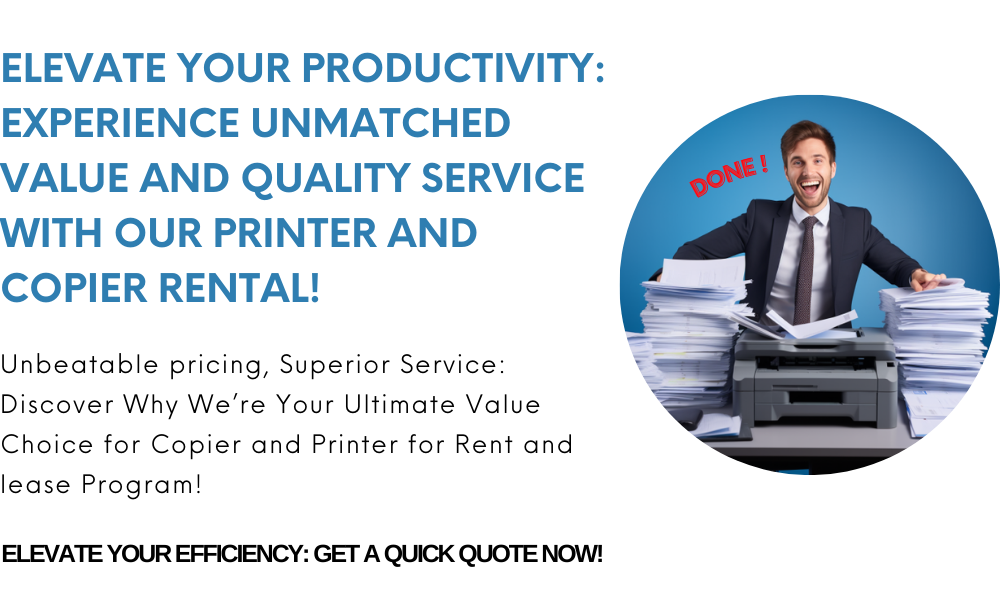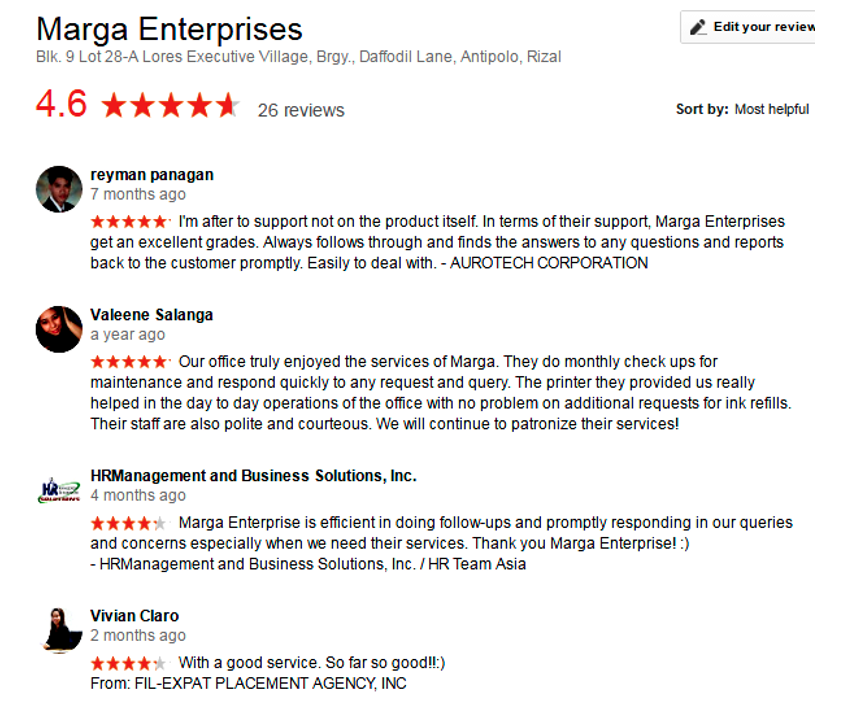Navigating Copier Lease Terms and Agreements in the Philippines

Navigating Copier Lease Terms and Agreements in the Philippines

In the ever-evolving landscape of business in the Philippines, optimizing document management has become a key focus for organizations. A strategic approach to achieving this is through copier lease, offering businesses the means to access advanced office technology while effectively managing costs. This article serves as your comprehensive guide, delving into the intricacies of copier lease terms and agreements. Whether you’re a small startup or an established enterprise, understanding these nuances is crucial for maximizing operational efficiency.
Deciphering the Complexity of Copier Lease Agreements
Copier leasing agreements can often be as multifaceted as the tasks your office copier handles. Successfully navigating these agreements requires a keen understanding of their components. In this article, we embark on a journey through the world of copier lease terms and agreements, equipping you with the knowledge needed to make well-informed decisions for your business. Discover the key elements that shape these agreements, ensuring you harness the full potential of copier leasing while optimizing costs. Offering you the necessary insights to make well-informed decisions. (copier lease Philippines).
Copier Lease Terms and Considerations
When entering into a copier lease agreement in the Philippines, it’s essential to understand the various terms and considerations that will impact your experience. Below, we explore the key elements you should pay attention to:
1. Lease Duration
One of the first decisions you’ll encounter is the lease duration. Copier leases typically range from 12 to 60 months. Consider your business’s future needs and growth prospects when choosing the lease duration. A longer lease may offer lower monthly payments but could lock you into outdated technology.
2. Monthly Payments
Understanding the monthly lease payments is crucial for budgeting. Clarify whether payments are fixed or variable and whether they include maintenance and consumables. Be aware of any hidden fees.
3. Equipment Type and Model
Choose the copier model that aligns with your office’s document management needs. Ensure the lease agreement specifies the exact equipment you’ll receive, including any optional features.
4. Maintenance and Support
Ask about the maintenance and support services included in the lease. Will the lessor provide regular servicing, repairs, and replacement of consumables like toner and paper? Clear communication on these aspects is vital.
5. Usage Limits and Excess Charges
Most copier lease agreements set usage limits. Be aware of these limits, and assess whether they match your business’s expected usage. Exceeding these limits may result in additional charges, so understanding the terms is essential.
6. End-of-Lease Options
Consider what happens at the end of the lease. Some agreements offer options to purchase the copier, renew the lease, or return the equipment. Understanding your choices ensures a smooth transition.
10 Frequently Asked Questions (FAQs)
Q1: Can I upgrade the copier during the lease term? A1: Some lease agreements allow for equipment upgrades. Check with your lessor regarding upgrade options and associated costs.
Q2: What happens if the copier requires repairs? A2: Maintenance and repair services are typically included in copier lease agreements. Contact your lessor to report any issues promptly.
Q3: Can I terminate the lease early? A3: Early termination may be possible but often comes with penalties. Review your lease agreement to understand the terms.
Q4: Are consumables like toner and paper included? A4: Many lease agreements include consumables, but it’s essential to confirm this with your lessor.
Q5: Can I extend the lease if needed? A5: Lease extensions are often an option, but the terms may vary. Discuss extension possibilities with your lessor in advance.
Q6: What happens if the copier becomes obsolete during the lease? A6: In some cases, lessors may offer options to upgrade to newer equipment. Discuss this with your lessor if obsolescence is a concern.
Q7: How can I track usage to avoid excess charges? A7: Implement usage tracking within your organization to monitor copier usage and stay within the agreed limits.
Q8: Is insurance required for the leased copier? A8: Some lessors may require insurance coverage for the leased copier. Check your lease agreement for insurance provisions.
Q9: Can I negotiate the terms of the copier lease? A9: It’s often possible to negotiate some terms of the lease agreement. Consult with your lessor to explore options.
Q10: What documentation should I retain throughout the lease term? A10: Keep copies of the lease agreement, invoices, and records of equipment maintenance and repairs for reference.
Tips for Negotiating Copier Lease Agreements
Negotiating a copier lease agreement in the Philippines can significantly impact the terms, costs, and benefits you receive. Here are some valuable tips to help you navigate the negotiation process successfully:
1. Do Your Research
Before entering negotiations, gather information about the copier models and features you need. Research different leasing companies, their reputations, and the typical terms they offer.
2. Assess Your Business Needs
Determine your specific document management requirements. Understand factors such as the volume of printing and copying, required functionalities, and any potential future growth.
3. Seek Multiple Quotes
Don’t settle for the first offer you receive. Request quotes from multiple leasing companies to compare terms, pricing, and services. This provides leverage for negotiation.
4. Negotiate Lease Duration
Discuss lease duration options with the lessor. Shorter leases offer flexibility but may have higher monthly payments, while longer leases may provide cost savings.
5. Clarify Monthly Costs
Ensure you fully understand the monthly lease costs. Discuss any variable charges and confirm what is included in the base monthly fee.
6. Maintenance and Support
Negotiate the scope of maintenance and support services. Clarify which services are included, response times for repairs, and the availability of consumables.
7. Usage Limits and Excess Charges
Discuss usage limits and any potential excess charges. Consider your expected usage and negotiate terms that align with your business needs.
8. End-of-Lease Options
Understand your options at the end of the lease. Negotiate favorable terms for equipment purchase, lease renewal, or return.
9. Explore Customization
In some cases, lessors may allow customization of lease agreements. Explore opportunities to tailor the terms to your unique requirements.
10. Review the Fine Print
Thoroughly review the lease agreement, including any fine print. Pay attention to penalties for early termination, equipment return conditions, and insurance requirements.
11. Seek Professional Guidance
Consider consulting with legal or financial professionals experienced in copier leasing agreements. Their expertise can help protect your interests.
12. Be Prepared to Walk Away
If the terms offered do not align with your needs, be prepared to walk away from the negotiation. It’s essential to secure a deal that benefits your business.
Conclusion
Navigating copier lease terms and considerations is a critical aspect of securing the right copier for your business. By understanding lease duration, monthly payments, equipment details, maintenance, usage limits, and end-of-lease options, you can make informed decisions that optimize document management efficiency.
Call to Action
For small businesses in the Philippines in search of a dependable and cost-effective copier leasing solution, Marga Enterprises is your go-to provider. Contact us at 09171642540, 09614481276, 02-721-69-415, or email marga.enterprises2013@gmail.com for personalized service and expert advice. Visit https://marga.biz/copier-lease/ to explore our range of copier lease options and find the perfect fit for your business needs.
CLIENT TESTIMONIAL

